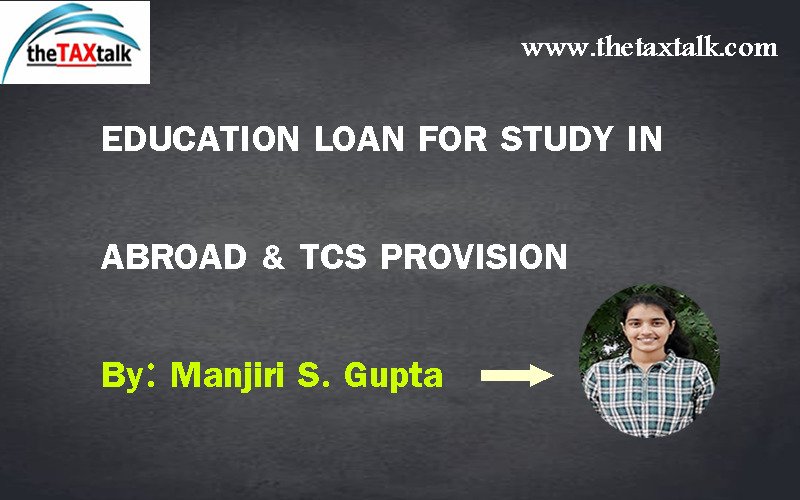![]()
EDUCATION LOAN FOR STUDY IN ABROAD & TCS PROVISION By: Manjiri S. Gupta
(The author is an Article Assistant at SSRPN & CO. Nagpur. She can be approached at cassrpn@gmail.com)
Higher studies in abroad has become a vital aspect as it adds value to a person’s qualification. Studying abroad is an amazing experience, but it is incredibly expensive. Many students cannot afford studying in abroad as there a many ancillary expenses including college fees, cost of accommodation, travelling expense and many more. As a result lot of students borrow education loan to fund their higher education.
We all know that education loan repayment is not a cheap affair. So, section 80E of the Income Tax Act,1961 has a provision for income tax exemption on education loan, which is a saving grace to students who want to repay their education loan without any additional financial burden. An assessee can declare the interest paid towards their education loan under this section and that amount will be exempted from their yearly income tax deductions.
Education loan for study in abroad comes with two main tax benefits, one is tax deduction under Section 80E of the Income Tax Act and the second is concession on Tax collected at source (TCS).
-
Section 80E of Income Tax Act: Following are the features to claim deduction under section 80E are:
-
Deduction is available only for the interest part of loan repayment amount, no deduction can be claimed for principal part of the EMI.
-
Exemption can be claimed only by the individuals who has taken loan for higher education, it cannot be claimed by HUF, company or any other type of tax payers.
-
The deduction is available only against the loan that is taken for higher education.
-
Loan must be taken from notified Financial institution or a recognized Charitable institution.
-
Loan must be taken to support higher studies of self, spouse, children or for the student for whom assessee is the legal guardian.
-
There is no upper limit for the deduction to be claimed i.e. the amount of deduction that can be claimed is equivalent to the amount of interest paid on loan taken.
-
Deduction can be claimed only when the assessee starts repaying the loan. It is available for a maximum 8 AY or until the interest is completely repaid, whichever is earlier.
-
Tax collected at source (TCS): Finance Act 2020, introduced Section 206C(1G) under the Income Tax Act 1961, which imposes 5% TCS on foreign remittances exceeding Rs. 7 Lakhs in a financial year. But in case of education loan, TCS applicable on educational expenses is only 0.50% on foreign remittances exceeding Rs. 7 Lakhs.

